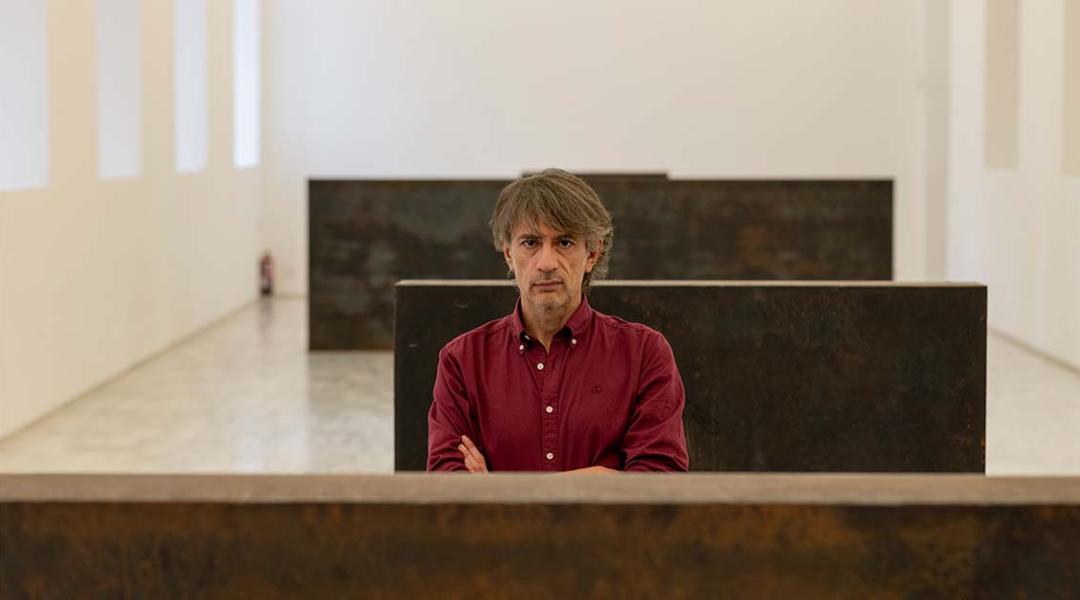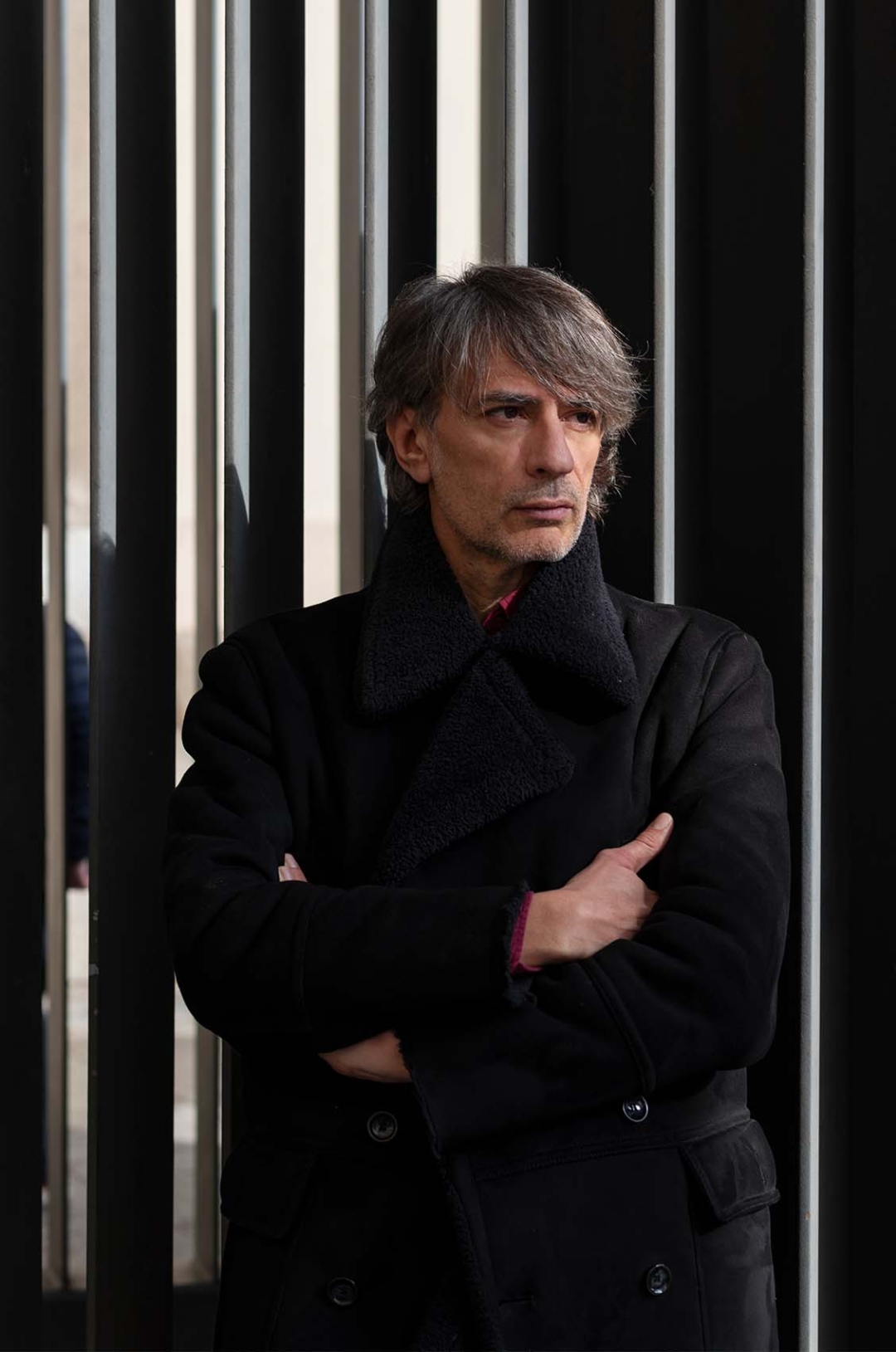Juan Tallón
Masterpiece

Writer Juan Tallón makes a U-turn after the success of 'Rewind' and delivers 'Obra maestra' [Masterpiece]. Through a thriller-style narrative, the novel explores the mysterious disappearance of the 38-tonne sculpture ('Equal-Parallel/Guernica-Bengasi') that Richard Serra conceived for the opening of the Museo Reina Sofia in 1986. Keep an eye on his answers!
In Rewind, writer Juan Tallón (Vilardevós, Ourense, 1975) left readers with a knot in the pit of their stomachs with a troubling question: how do you carry on living after losing everything in an explosion? Five voices rebuilt the tragedy of not being able to turn back time. His new novel, Obra Maestra [Masterpiece], is based on a real investigation of an unbelievable event: the disappearance of a monumental sculpture weighing 38 tonnes and valued at 37 million pesetas, belonging to the Museo Reina Sofía in Madrid since 1986. That sculpture by Richard Serra (Equal-Parallel/Guernica-Bengasi), consisting of four giant steel blocks, simply vanished into thin air from the warehouse where it was stored. The worldwide scandal because of its loss, the replica the sculptor agreed to repeat as “original” and the mystery surrounding what might have happened with the first sculpture make up recently published work.
How was your first encounter with Richard Serra’s sculpture, featured in Obra Maestra?
Although I’d heard the story about the disappearance of the original sculpture when it appeared in the media in 2006, I didn’t see it for the first time in person until 2009. In fact, I almost bumped into it accidentally, when I was fleeing from an exhibition at the Museo Reina Sofia...
You were fleeing?
Yes. I’d gone to see Juan Muñoz’s exhibition with writer César Aira, and one of the rooms was full of human figures in trench coats with disturbing smiles. César thought that there were so many because unsuspecting visitors turned to stone, and we could be next (laughs). We ran away and accidentally ended up in room 102, where Richard Serra’s sculpture was.
“I believe we all have a kaleidoscopic gaze, and there aren’t two identical ways of seeing or telling things”
What impression did it give you?
It was striking. And it all came back to me: the news about the disappearance of the first sculpture, the international scandal, the replica Serra agreed to define as “original”. I like to think that that was the moment when the idea for Obra maestra was born. Sometimes it’s hard to determine when things start, because perhaps they’re dormant and you only become aware over time. Serra’s sculptures appeal to me because of their monumental character and because they demand interaction, they question you, and invite you to move through them.
Serra’s talent has been inspiring for you, but how would you define talent?
It’s complicated... Perhaps it’s not foreshadowed, or named, but it’s detected. But not as talent itself. You read a book, see a film, or stand in front of a work of art, and you can tell that it’s clearly brilliant. That’s how that author or creator reveals their talent. I prefer to point a finger and say: “There’s talent here.” Perhaps I’d say that talent is the ability someone has to do something unexpected and surprise you.
What was the novel’s creative process like?
Obra maestra is essentially structure. There’s a what, a story, but it becomes so thanks to the how. Works specifically stand up, hold themselves up and sometimes fall down; they’re subject to the rules of architecture. Finding the way to tell this story kept me occupied for ten years. I knew what I wanted to tell, but not how to do it so it’d remain mysterious from start to finish. In the absence of the how, of the necessary structure, I started gathering information, collecting testimonies, and writing other novels I did know how to write. There came a time when I finally realised how to pool the many approaches I had to tell the story, and the only way was maintaining their specificity, for each approach to be resolved through a single voice in the first person.

For Juan Tallón, one of the keys of his new novel, ‘Obra maestra’, is its structure. © Laura Ortega
And they add up to more than 70 voices, while there were five in Rewind. Is this a way of increasing the difficulty with each novel and putting your talent to the test?
When I wrote Rewind, Obra maestra was already coming together in my mind. I wrote Rewind in 34 days, although I spent a year rewriting it, and it became clear to me that I was interested in looking at the world or the object of the novel from different angles. I believe we all have a kaleidoscopic gaze, and there aren’t two identical ways of seeing or telling things. Rewind was a test of what was to come. One novel helped the other because there was a point where I was writing both at the same time. In fact, Rewind was published on the 12th of February 2020, and I’d been writing Obra maestra at full speed since November 2019.
Such creative speed! Have you ever suffered from writer’s block?
I don't start writing a novel until it’s all at my disposal, unless I’m sure that I have the strength to write it like a man possessed. If I don’t have the story, I don’t even bother sitting down. That’s why, when I do sit down, there’s no fear of writer’s block. I already know what I want to say. The block is the years or months that can go by between one book and another. And my speed it’s related to the fear of death. I start writing and progress very quickly. I need to finish my first draft at full speed, and I don’t care if I’m not satisfied with it at the beginning. This way, if I died, the novel could be polished. There’s nothing that causes me more anguish than the idea of dying halfway through a novel. There’s an irrational aspect: writing quickly for fear of dying.
“There’s nothing that causes me more anguish than the idea of dying halfway through a novel”
Which is the challenge you need to overcome when you start writing and what difficulties arise?
The challenge is reaching the end of the novel alive. Another is keeping the reader awake, interested and, at the same time, make them think, but without it becoming a purpose in itself. When you develop a passage, obstacles may arise, but you have to face it. I write and erase, but that’s not being blocked to me. Erasing is writing. I feel the same pleasure doing something as I do undoing it. I don’t feel frustrated, I've come to terms with the fact that adversity is part of literature. Either way, you don’t come to this certainty at the beginning of your career. I’ve had to do things really badly to do them slightly better later.
Occasionally, people have described your literature as an “analysis of defeat”. Do you identify with that statement?
This refers to a specific era and titles of my work, but it can’t cover everything I do in the slightest. I don’t even have a literary universe that all my novels fit into harmonically. And I like it that way. I’m not interested in creating that universe, I need each novel to be almost impossible to write and for it to create uncertainty. Although I do admire writers who create different novels that refer to a common universe.


